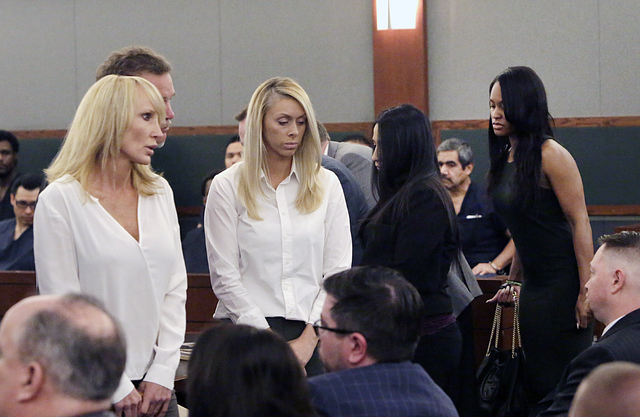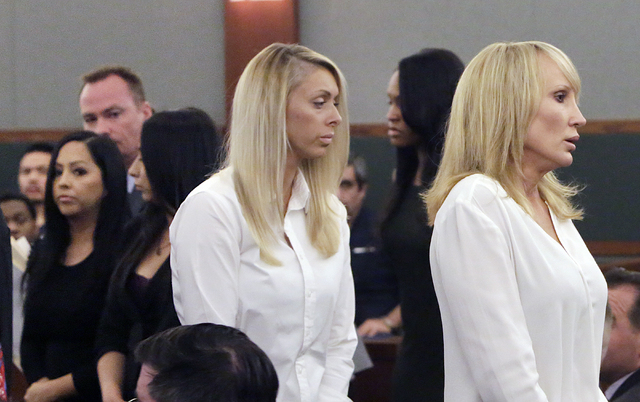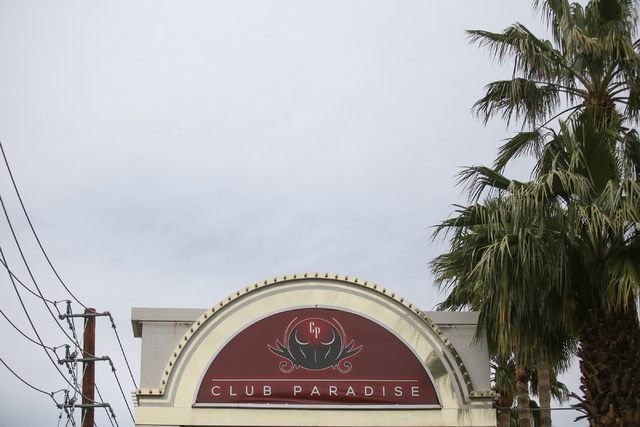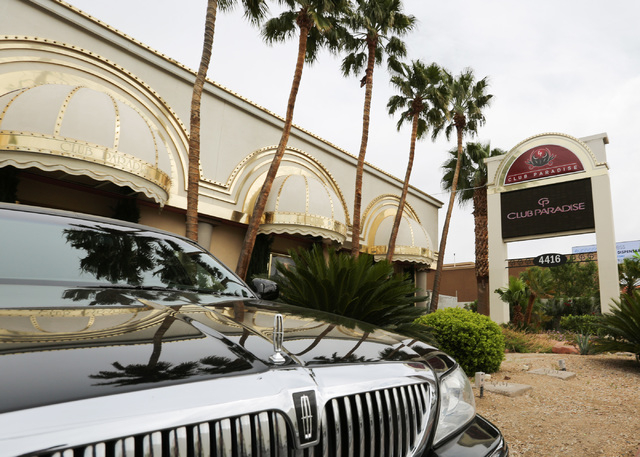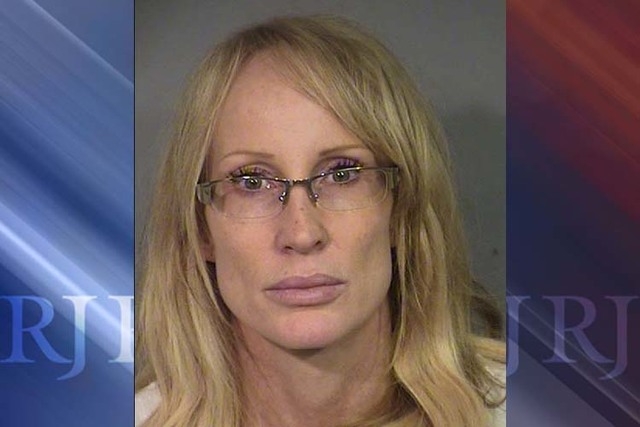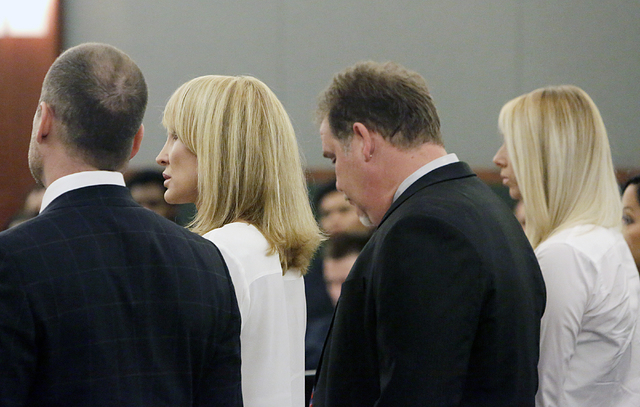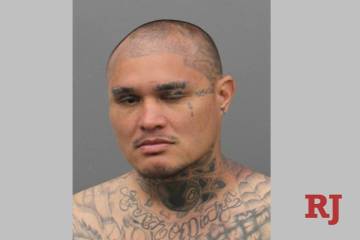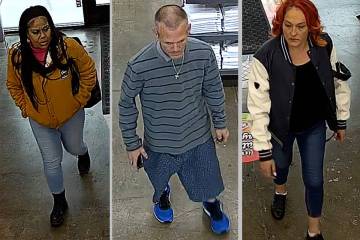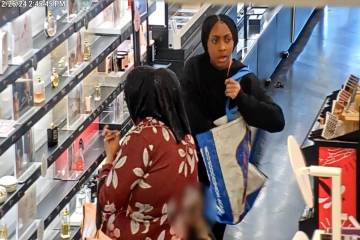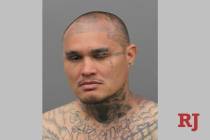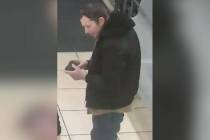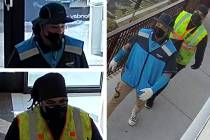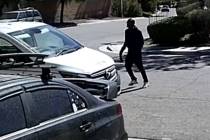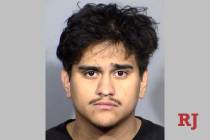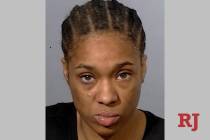Fraud escalated at Club Paradise after police warned management, detective says
Metro investigators warned Club Paradise management in January 2014 that their business license could be revoked if they didn’t crack down on credit card fraud that had been going on about a year in the strip club’s VIP area.
Instead of trying to stop the fraud, “the crime actually escalated after the encounter between our squad and their management team,” Aaron Fink, a detective with the Metropolitan Police Department’s criminal intelligence unit, told a Clark County grand jury.
Court records made public last week detail how for the next six months club management and dancers used muscle and booze to get men to sign five-figure checks.
Testimony from one of the club’s former managers, John Richard Carcilli, also indicates that past owner Sam Cecola knew what was going on and even took money from the dancers and waitresses. After the club was raided in June 2014, Cecola sued his former employees, saying he was forced to sell the business at a low rate because of the high-profile investigation.
Earlier this month, the grand jury indicted five women, including waitresses Amy Rohr, 35, Chris Giraldo, 31, Diana Giraldo, 29, and dancers Celeste Mohar, 40, and Cyndi Sellers, 25. Each pleaded not guilty in court Monday to credit card fraud and conspiracy charges.
“We’re going to prevail at trial,” defense lawyer Michael Gowdey, who represents Rohr, said after the hearing. “It’s outrageous that they always try and pick off the low-hanging fruit. If they’ve got a problem with the policies and procedures of the club, then they should go after the policies and procedures of the club.”
He stopped short of naming Cecola directly.
Attorney Ross Goodman, who represents Mohar, a single mother, said she turned herself in on a warrant earlier this month and was released on bail.
“You would think that if it’s as prevalent as they’re alleging that others would have been charged, including the owner,” Goodman said.
Carcilli and two other dancers, Giovanna Chico and Bibi Rambharan, pleaded guilty to fraud charges in March, according to online court records. Their deals with prosecutors were sealed.
In June 2014, Las Vegas police and Internal Revenue Service agents raided the club, operating for two decades on Paradise Road.
Sam Paik, who owns strip clubs in Atlantic City and Philadelphia, bought Club Paradise and reopened it six months after the raid, remodeling the logo and taking meticulous efforts to ensure fraud doesn’t occur under his watch.
Now, he said, he’s considering changing the name of what was once known as one of the world’s premier gentlemen’s clubs.
“Looking back, I didn’t realize how severe this credit card fraud issue was,” Paik said. “But I do know now.”
Paik said he fired anyone who had access to the credit card terminal under the former management.
Two weeks prior to her indictment, Rohr applied to get her old job back. She was rehired, but Paik said that as soon as he learned Rohr had been implicated in the fraud, he let her go.
Under the new ownership, management must verify and sign off on credit card transactions. Anyone who runs up a large bill is fingerprinted and must sign a disclaimer and have his picture taken.
Paik has a bookkeeper who examines all transactions and reports irregularities to him.
“I’m seriously thinking about changing the name,” he said. Fraud under the previous ownership “keeps coming up, and it’s not good for my business.”
Between January 2013 and June 2014, more than 400 men were charged for private dances that never happened, liquor they never purchased and “dance dollar” tips they never handed out, Chief Deputy District Attorney Mark DiGiacomo said. One night, the women tried to run up $483,000 worth of charges on one man’s credit cards in a 12-minute stretch, and about $80,000 went through.
Surveillance video showed some men staggering toward a podium to sign their bills, others being surrounded by club staff.
DiGiacomo declined to say whether authorities would seek charges against anyone else at the club.
In late 2012, the club changed its policy on how credit card transactions were handled, and staffers saw quick cash, according to Carcilli’s testimony.
“It opened itself up to where you feel like if somebody wanted to do something fraudulently they probably would have an opportunity to do so,” Carcilli said.
If a waitress or dancer rang up an unusually large bill, management did not question the transaction, Carcilli testified.
“There was a hole in the system where if they wanted to do that it would be hard to catch in that case because a lot of the stuff we get is after the guest already left,” he said. “I usually take the position of the staff member.”
Management never reviewed surveillance footage to determine whether a customer received the service for which he paid.
“The club certainly could have done exactly what we did,” DiGiacomo said, “and identified the fraud at any given point in time.”
At one point, Carcilli said he suggested that Cecola create a policy that would not facilitate credit card fraud.
“Let’s not blow the guy out, in a sense,” Carcilli recalled telling the owner. “You can see that he’s not going to want to spend this much, even though he’s kind of doing it now. You know, let’s help him out. And (Cecola) basically said, ‘No, just keep doing what’ you’re doing.’”
On especially large bills, Cecola would withhold at least 50 percent until the credit card charge was resolved. The money was supposed to be distributed to the dancers and waitresses after charges were cleared.
“I’m not saying it doesn’t happen,” Carcilli testified. “I just don’t see the outcome of it.”
Customer Justin Bryant entered Club Paradise on Feb. 8, 2014, celebrating his 30th birthday.
He testified that he agreed to pay about $500 for an hour in a VIP room, which carried a surcharge and a mandatory additional cost for a bottle of liquor.
Later, as he approached the podium to sign his check, he was in “complete and utter shock” when he found his bill totaled more than $12,000.
He said he was surrounded by six to 10 people, including waitresses, dancers and bouncers.
“I was intimidated,” he said. “You hear about organized crime and things like that and when you have that many people standing around you and being intimidating … honestly you don’t know what’s going to happen.”
Tourist Daniel Castagna arrived at the club later that month. He thought he spent $800 and returned home to Pittsburgh to find a credit card bill of $10,000, he testified.
In April 2014, just two months before the raid, Nathan Osborne walked into Club Paradise but could not recall walking out.
“I actually presume I was drugged,” he said. “I had been drinking. I was with a dancer, and I don’t remember like feeling drunker and drunker. I just remember at one point it’s black, and I’m in my hotel room waking up the next morning.”
He had been charged $21,000.
“I have no recollection of signing anything,” he said.
Authorities searched for cocaine, methamphetamine and other party drugs. They found several liquids and pills, but none were illegal substances, Fink said.
In late 2014, Club Paradise filed suit in District Court against three former managers — Carcilli, Ryan Carlson and Ricardo Tabares — along with three strippers — Chico, Rambharan and Sellers — in connection with the scheme.
Dominic Gentile, who represents the former owners, said they have cooperated with prosecutors and provided information uncovered while investigating the civil claims.
John Spilotro, a lawyer for Carcilli, said he believes Carlson and Cecola should face criminal charges.
“I’m definitely shocked that Carlson isn’t charged,” the lawyer said. “Cecola I definitely question why he wasn’t charged … The way Cecola participated in employees tips is definitely against the law. You can’t take an employee’s tips. I’m shocked that he hasn’t been charged with that. At the very least, the labor board should have stepped in.”
Contact David Ferrara at dferrara@reviewjournal.com or 702-380-1039. Find @randompoker on Twitter.



